
In the latest twist in the Federal Communications Commission’s pursuit of “net neutrality” rules to prevent broadband providers from discriminating against certain types of traffic flowing over their lines, federal regulators are seeking public input on what rules should apply to wireless internet access and specialized services that aren’t part of the internet but are delivered over wired broadband connections.
The agency’s move comes a few weeks after Google Inc. and Verizon Communications Inc. announced a proposal of their own that would allow the FCC to enforce net neutrality rules for wireline broadband traffic would but exempt wireless carriers. The companies’ plan, which was not popular with public interest groups, also would leave room for broadband providers to charge extra to route traffic from so-called “premium services” over dedicated networks that are separate from the public internet.
FCC Chairman Julius Genachowski, as well as many internet content providers, public interest groups, and education organizations, say net neutrality rules are needed to prevent phone and cable companies from abusing their control over high-speed internet access to become online gatekeepers for content.
But the commission faces fierce resistance from phone and cable companies, which insist they need flexibility to manage network traffic to prevent high-bandwidth applications from hogging capacity. Phone companies are particularly opposed to applying net neutrality rules to wireless services, which have more capacity constraints than wired systems.
Phone and cable companies also fear that strict net neutrality rules would prevent them from charging a premium for specialized services that travel over dedicated networks, often called “managed services.” That category includes video services such as AT&T Inc.’s U-Verse and could expand to include online gaming, remote medical monitoring, and power grid controls. Some education groups are worried these also could include video services used for distance education.
Broadband providers, on the other hand, warn that rules prohibiting them from offering premium services could discourage them from continuing to invest in their lines.
Last month, Verizon and Google offered their own policy proposal to try to find a middle ground on net neutrality. Their plan would prohibit phone and cable companies from slowing down, blocking, or charging to prioritize internet traffic traveling over their regular broadband lines. But it would allow broadband providers to charge extra for services like U-Verse that are separate from the public internet.
The Verizon-Google plan also would exempt wireless services from net-neutrality rules.
The FCC’s decision to seek public comment on both issues is a disappointment to public-interest groups that have been calling on the agency to move ahead quickly with strong net-neutrality regulations. They say these rules are needed to prevent phone and cable companies from favoring their own services or those of business partners and from discriminating against internet phone calls, online video, and other web services that compete with their core businesses.
“While the FCC continues to play the game of kick the can down the road, consumers are left unprotected,” said Free Press Research Director Derek Turner. He added that “nothing in today’s notice contains anything new.”
Free Press and other public-interest groups have also been sharply critical of the proposal from Verizon and Google. They say it would create a two-tiered internet with a fast lane for online companies that can pay more and a slow lane for everyone else. They also complain that it includes a giant loophole for the mobile web at a time when more and more consumers are going online using handheld devices.
Net-neutrality rules have been a top priority for Genachowski since he joined the FCC last summer. The agency has been trying to craft some sort of compromise on the issue in recent months, but those efforts recently reached an impasse. In a statement, Genachowski said the FCC “will continue to be vigilant in guarding against threats to internet freedom.”
Even before it moves ahead with any network neutrality proposal, the agency first must establish its authority to regulate broadband in the aftermath of a federal appeals court ruling in April that cast doubt on its existing regulatory framework.
Comments on the FCC’s inquiry are due 30 days after its public notice is published in the Federal Register, and reply comments are due 55 days after this date. Comments can be filed online at http://www.fcc.gov/cgb/ecfs by referencing GN Docket No. 09-191 and WC Docket No. 07-52.
See also: “Opinion: Corporate policy making would result in a net loss.”
- Educators love their edtech, but want more training - April 18, 2024
- Friday 5: College and career readiness - April 12, 2024
- Cybersecurity: eSN Innovation Roundtable - April 11, 2024

